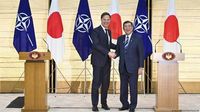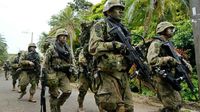As tensions rise in East Asia, Japan is ramping up its military preparedness, reflecting growing concerns over threats from China, North Korea, and Russia. The country is not only enhancing its defense capabilities but also actively warning its citizens about the potential for conflict. This shift comes at a time when the United States, a key ally, is perceived as becoming less reliable in its commitments to security in the region.
On April 10, 2025, a report highlighted Japan's alarming pivot towards militarization, underscoring a sense of urgency as the nation braces for possible conflict. The Japanese government has begun arming itself more robustly, with officials emphasizing the need for readiness against potential aggressors in the region. The implications of this shift are significant, as Japan's historical pacifism is challenged by the realities of a changing geopolitical landscape.
In a related development, NATO Secretary General Mark Rutte visited Japan for two days, marking his first official trip to the country since taking office in October 2024. His visit was primarily focused on strengthening NATO's cooperation with regional partners amid escalating security tensions stemming from China's assertive military posture and North Korea's unpredictable behavior. Rutte's discussions included a visit to the Yokosuka naval base, south of Tokyo, where he inspected a Japanese frigate and mine-sweeping equipment.
During his visit, Rutte expressed deep concerns regarding China's support for Russia's military operations in Ukraine and its rapid military expansion in the Asia-Pacific region. "We must not be naive," he warned, highlighting the importance of collaboration among NATO member states and partners like Japan in the face of these threats. Political analyst Ryo Hinata-Yamaguchi from the Tokyo International University noted that both NATO and Japan are eager to deepen their relationship after years of gradual rapprochement.
The past decade has seen a marked increase in NATO's operations in Northeast Asia, with joint military exercises involving land, sea, and air forces from various nations conducted in Japan. In a further show of solidarity, the British government announced the deployment of a maritime task force to the region, led by the aircraft carrier HMS Prince of Wales and supported by twelve other nations. This task force will engage in summer exercises with the navies of India, Singapore, Malaysia, and Australia, and will collaborate with the South Korean military to prevent the smuggling of goods into North Korea.
One of the notable aspects of Rutte's visit was Japan's expressed interest in joining NATO's mission to support Ukraine. Japanese Defense Minister General Nakatani informed Rutte that Japan is considering participating in NATO's Security Assistance and Training for Ukraine (NSATU). While Japan has provided non-lethal aid to Ukraine, including helmets, protective vests, medical supplies, and anti-mine technology, it has maintained a strict policy against supplying lethal weapons to warring states. Nonetheless, this potential involvement in NATO's Ukraine mission signifies a significant shift in Japan's defense posture.
Nakatani remarked, "Both Japan and NATO face many challenges. Our security environment has become increasingly difficult." Japan is keen to deepen its security cooperation with NATO and learn valuable lessons from Russia's ongoing war against Ukraine. Although there are no current indications that Japan will supply weapons to Ukraine, the country's willingness to engage in NATO's training and support efforts is a crucial step forward.
Prime Minister Shigeru Ishiba, who met with Rutte during his visit, reaffirmed his commitment to enhancing Japan's defense collaboration with NATO. Ishiba has previously expressed ambitions to establish an Asian version of NATO, a concept that has drawn skepticism from some analysts. James Brown, a political scientist at Temple University’s Tokyo campus, noted, "The collaboration between Japan and NATO is gaining momentum. Japan has always aimed to do more for its own security alongside NATO countries and like-minded nations such as Australia. However, as the U.S. proves to be a less reliable ally, this becomes increasingly important."
While Ishiba's vision of an Asian NATO remains largely aspirational, the current geopolitical climate is pushing Japan closer to NATO and its partners. The urgency of the situation is palpable, as Japan navigates its historical pacifism against the backdrop of rising military threats from neighboring countries.
As Japan prepares for potential conflict, the implications of its military buildup and deepening ties with NATO could reshape the security dynamics in East Asia. The collaboration among nations in the region, particularly in response to the aggressive posturing of China and North Korea, is crucial. The coming months will likely reveal how these developments will influence Japan's role on the global stage and its approach to international security.






